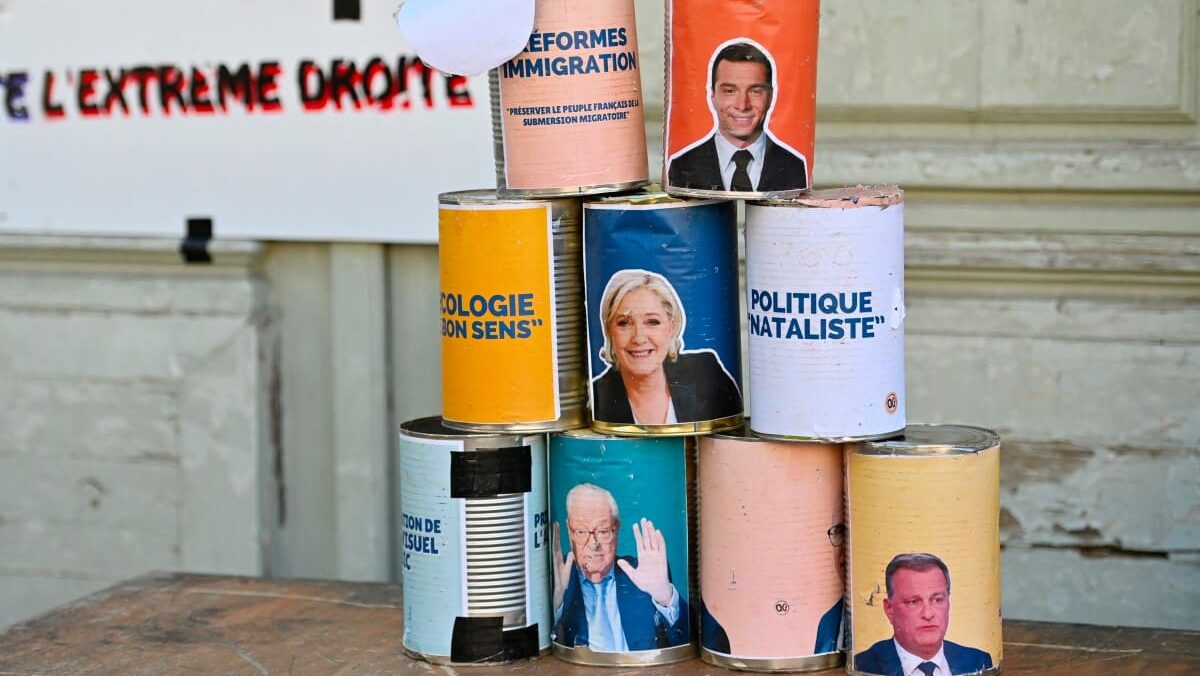
The pictures of Rassemblement National (RN) President and lead MEP Jordan Bardella (top), president of the RN parliamentary group Marine Le Pen (mid row), founder of the Front national (FN) far-right party Jean-Marie Le Pen (bottom L) and RN Mayor of Perpignan Louis Aliot (bottom R) are seen on cans used in a tin can alley game during a rally against the far-right at Place Albert 1er in Montpellier on July 4, 2024, ahead of the second round of France’s legislative elections.
Photo: Sylvain THOMAS / AFP
The second round of the French parliamentary elections is about to take place in an atmosphere of high tension. Police are being deployed throughout the country in fear of outbursts of protests and violence. Emmanuel Macron, the architect of the situation into which the country has been plunged for nearly a month, is trying to keep as low a profile as possible.
The Minister of the Interior, Gérald Darmanin, announced the deployment of 30,000 police and gendarmes for the second round, which is due to take place on Sunday, July 7th. Paris alone is planning to deploy 2,800 police officers, compared with 1,700 for the first round. The situation is similar in the country’s other main cities. These resources have been justified to “prevent the risk of public disorder and urban violence” and should be mobilised “until at least July 16th”, in addition to the security arrangements already in place for the Paris Olympic Games.
This is a precautionary decision, given that no call for demonstrations has yet been received from any political force. The prediction of riots has still been fanned and provoked by the parties of the Left and Centre, who are crying fascist danger in the event of a Rassemblement National (RN) victory.
On the part of the government, the signal sent out by this mobilisation reinforces the message that has been practised over the past week on the threat looming over France in the event of a victory for the RN—at a time when the prospect of an absolute majority for the national right is becoming increasingly remote, given the scale of the withdrawals made on the Left and in the centre to favour the election of deputies opposed to the RN.
The brief campaign for these snap elections was marked by an explosion of violence across the country. According to the Minister of the Interior, Gérald Darmanin, “51 candidates, substitutes or activists” have been “physically attacked” since the start of the legislative campaign, with the phenomenon accelerating in the last few days. All parties have been affected. Government spokeswoman Prisca Thevenot, who is standing for re-election in the 8th constituency of Hauts-de-Seine near Paris, and her team were attacked while putting up election posters. Several candidates from the RN and its allies were also subjected to violent attacks, such as Marie Dauchy, a candidate in Savoie, who had to suspend her campaign.
Since the results of the first round were announced, President Emmanuel Macron has chosen to remain in the background in the media. His silence is enabling him to rebuild an image of a wise president above the fray, seriously dented by the decision to dissolve the National Assembly, which threw the whole of French politics into embarrassment and consternation, including among his most loyal supporters. According to his entourage, this is a conscious strategy: given his unpopularity, he runs the risk of turning voters away from his camp even more. “He has finally understood that the more he talks, the more voters we lose,” a Macronist MP explained to Europe 1.
He is nevertheless expected to speak on the evening of the second round, once the composition of the new National Assembly is known, in order to outline the prospects for the next government.
